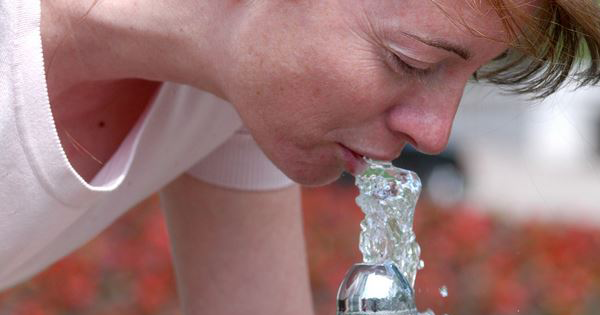Advertisement
How many times a day to you really feel thirsty? If you answered anything but “zero,” you may already be dehydrated.
The human body is composed of nearly 92% water, so it makes sense that you should try to stay hydrated as often as possible.
Simply getting out of bed and going to work can cause you to lose up to 10 cups of water a day—even more now that the weather is heating up.
Of course, you’ve already heard how important water is in maintaining your physical health, but did you know that dehydration could be the reason behind your fatigue and weight gain?
Here are just a few of the many ways dehydration could be putting your health at risk:
- Digestive Problems: Without enough water flowing through the digestive tract, your body may be having major problems trying to pass food through the intestines and regulate bowel movements. If you’re not drinking enough water, you may experience indigestion or constipation, which might be the reason why you feel bloated and gassy.
- Skin Problems: As the largest organ of the body, your skin is responsible for getting rid of harmful waste and toxins. But your skin must also regulate your body temperature, causing you to sweat out extra water. If you’re not replenishing that lost hydration, your complexion will really take a hit. Next time you’re experiencing pesky skin problems—like acne, dryness, psoriasis, or dermatitis—try increasing your water intake to see if that improves the look and feel of your skin.
- High Blood Pressure & Cholesterol Problems: If you’re not replenishing your body with the hydration it needs to function properly, you may be putting yourself at risk of developing high blood pressure. When there isn’t enough water flowing through your system, your blood will start to thicken and produce higher amounts of cholesterol. To avoid developing serious cardiovascular issues, like heart disease, always make sure to keep a bottle of water on hand at all times.
Advertisement
- Fatigue: Ever feel your energy levels start to crash once the weather starts heating up in the afternoon? After a busy morning, you probably forgot to drink a bottle of water. Dehydration slows down the activity of major enzymes in the body, causing your energy levels to crash dramatically. Before you try to boost your energy with a cup of coffee, drink a glass of water. Remember: caffeine dehydrates your body!
- Weight Problems: A lot of people confuse thirst with hunger, but being dehydrated also makes it harder to control cravings. So, if you’re feeling that 3 p.m. snack attack, you might want to sip on a cup of water before opening a new bag of chips. Water can help you feel full, so you don’t start packing on the pounds with all those unhealthy snacks!
How often to you try to drink water? Let us know in the comments!
Photo Copyright © 2007 Wisconsin Department of Natural Resources/Flickr




